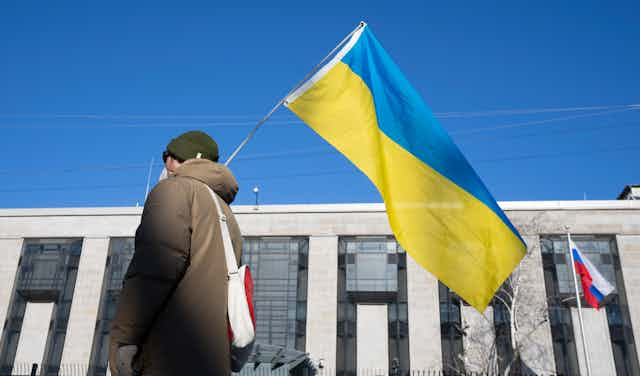In order to curb the spread of disinformation by official Russian news sources, the Canadian Radio-television and Telecommunications Commission (CRTC) recently made a symbolic move by banning Russia’s state-run RT news channel in Canada.
Yet this is an ineffective measure given the way social media channels controlled by the Russian Embassy in Ottawa are spreading disinformation, and how fact-checking is being weaponized by the Russian government to twist reality and confuse people about the war in Ukraine.
As a researcher who studies disinformation, I first investigated the way Arabic tweets with hashtags like #WeStandWithRussia and #RussiaHasAJustCause have been used since the beginning of this year.
New accounts
In my ongoing research, I’ve collected 26,440 tweets posted by 10,544 unique users who supported Russia. Over 27 per cent of the tweets were posted from accounts created in 2022, including 4,052 tweets in just one day on Feb. 15, 2022, and 5,457 tweets in the month of February alone. The highest number of tweets were posted in January and February 2022 by accounts created in these two months.
When I further examined the most-mentioned Twitter accounts that these users retweeted, I found they were the accounts of the Russian Embassy in Egypt (@Rusembegypt) followed by the Arabic-language Russian Ministry of Foreign Affairs (@Russia_AR). The majority of the other accounts frequently retweeted are related to other Russian embassies in the region.
These findings made me turn my attention to Canada.
The Russian Embassy in Ottawa runs its own Twitter account — @RussianEmbassyC — as well as a Telegram account and VK (Russia’s Facebook) public channels.
Similar to the findings in the Middle East, I have found that the Russian Embassy in Canada is active in spreading disinformation and promoting the Russian perspective on the events taking place in Ukraine.
‘Fake news’ accusations
Instead of heavily relying on RT or Sputnik, Canada’s Russian Embassy mostly retweets messages from the Russian Ministry of Foreign Affairs and other Russian embassies from around the world. That includes tweets that attempt to discredit any factual reporting on the war.
The Russian embassy also frequently posts official statements attacking Canadian politicians as well as Canadian media for what it views as their biased positions about the war in Ukraine. That included an attack on the Canadian government and the news media for allegedly spreading lies.
The term fake news itself is weaponized to serve the interests of the Russian government, similar to the way Donald Trump frequently used the term fake news when he was president of the United States.
One of the most troubling features of this Russian disinformation campaign pertains to the weaponization of fact-checking practices. In a recent tweet, the embassy announced the launch of a new website called waronfakes.com, which attempts to lend credibility to official Russian propaganda.
The website allegedly provides fact-checking services on the war in Ukraine and is offered in five languages (English, French, Spanish, Arabic and Chinese). Ironically, no Ukrainian or Russian-language content is offered, revealing what foreign audiences are being targeted by the Russian government. Nonetheless Russian content is offered on a Telegram channel.
Sudden flurry of new accounts
To understand who’s retweeting the Russian Embassy’s messages, I collected 4,796 tweets from 2022 posted by 3,796 unique users. Similar to the case of the Middle East, the month of February 2022 had the highest number of Twitter accounts created that subsequently retweeted posts from the Russian Embassy.
While this might not prove any co-ordinated inauthentic activity, it does look suspicious.
The Russian Embassy in Canada mostly retweets messages sent by the Russian Foreign Ministry, like @mfa_russia and @mid_rf, and vice versa. The @mfa_russia account is the second-most active in terms of retweeting messages sent by the Russian Embassy.
Though the official and public efforts in Canada in terms of cracking down on Russian disinformation has been to ban the RT and Sputnik news channels, the reality is that Russian embassies are creating their own information echo chambers.
Social media also creates direct engagement with the Canadian public that cannot be blocked by CRTC. The embassy often sends direct messages like the one below via its Telegram channel:

Other times, the embassy urges the Canadian public to mistrust news coverage of the events in Ukraine.
My analysis shows the CRTC’s decision to ban RT is ineffective because the news channel can be viewed on multiple platforms in Canada and elsewhere.
Russian disinformation has evolved to increasingly rely on various information sources, including the social media outlets of diplomatic missions around the world as well as fake fact-checking sites like waronfakes.com.
The disinformation war that Russia is fighting is being fought on different linguistic fronts — the English language is only one of them — and it’s mostly being waged on social media.
This is a corrected version of a story originally published on April 10, 2022. Figures have been updated in relation to the Arabic tweets and Russian embassy tweets.

